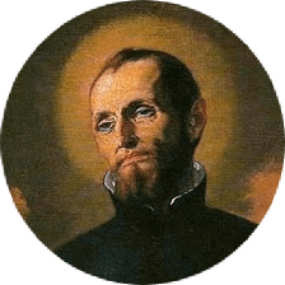
7 August
St Cajetan (1480-1547)
Priest
Born: 1 October 1480 Vicenza, Veneto, Republic of Venice (now Italy)
Died: 7 August 1547 (aged 66) Naples, Campania, Kingdom of Naples
Venerated in: Roman Catholic Church
Canonized: 12 April 1671, Rome by Pope Clement X
Patron: job seekers; unemployed.
With the future Pope Paul IV, St. Cajetan founded the first congregation of Clerks Regular, a new form of institute which corresponded with the needs of the time. Trust in God was its principal rule; its members were forbidden to ask for alms and depended entirely on the spontaneous charity of the faithful. Such was Cajetan’s zeal in seeking the salvation of souls that he came to be called “the hunter of souls.” He died at Naples on August 7, 1547.
COLLECT PRAYER
O God, who endowed the Priest Saint Cajetan with the grace of imitating the apostolic way of life, grant us, through his example and intercession, to trust in you at all times and to seek unceasingly your Kingdom. Through our Lord Jesus Christ, your Son, who lives and reigns with you in the unity of the Holy Spirit, God, for ever and ever.
Things to Do:
- Read Unemployed due to coronavirus? There’s a saint for that.
- Watch this YouTube video about St. Cajetan.
- View photos of the Basilica di San Paolo Maggiore where the remains of St. Cajetan are interred in the crypt of the church.
- Read more about St. Cajetan here and here.
- Find some prayers to St. Cajetan here
St. Cajetan
Cajetan, a co-founder of the Theatines, received the office of protonotary at Rome from Pope Julius II when still quite young. After he was ordained priest in 1516, he left the papal court and dedicated himself entirely to the service of the Lord. With his own hands he cared for the sick. Such zeal did he show for the salvation of his fellowmen that he was surnamed the “huntsman for souls.”
In order to raise the standards of ecclesiastical discipline among the clergy, Cajetan founded in 1524 a community of Clerks Regular who were to lead an apostolic life. They were to look with disdain upon all earthly belongings, to receive no income, to accept no salaries from the faithful; only from that which was freely offered were they allowed to retain the means of livelihood. Thus they were to rely unreservedly upon Divine Providence.
St. Cajetan often prayed eight hours daily. He was particularly active during the Breviary reform under Pope Clement VII. He was kind, mild, but above all, humble. He asked God that no one should know the place of his burial. While attending the Christmas celebration at St. Mary of the Crib, he is said to have been given the grace of receiving from Mary the Child Jesus into his arms. During the sack of Rome by the soldiers of Charles V in 1527, he was tortured and cast into prison because he refused to surrender certain church monies which, in fact, he had distributed among the poor. An insurrection filled him with such grief and sorrow that he took sick and died.
— Excerpted from The Church’s Year of Grace, Pius Parsch
Source: Catholic Culture